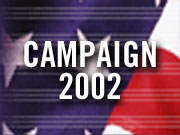Gubernatorial candidates stick to their scripts
October 22, 2002
With the election just two weeks away, Minnesota's major-party gubernatorial candidates are scrambling to pick up the state's remaining undecided voters. The candidates met Monday night for a televised debate on KSTP. Recent polls show a virtual dead heat between Republican Tim Pawlenty, DFLer Roger Moe, and Independence Party nominee Tim Penny. But each played it fairly safe, sticking to his campaign's familiar themes and avoiding dramatic shifts that could fracture his base of supporters.
Minnesota's next governor is expected to face a deficit that could approach, or even exceed, $3 billion. Faced with that prospect, the three front-running candidates have mostly tip-toed around the issue. They've declined to specify what taxes -- if any -- might be raised, or what programs -- if any -- might be cut in order to right the fiscal ship. Only Green Party candidate Ken Pentel, who polls indicate is trailing well behind his opponents, has offered a concrete solution -- charge businesses for their use of the state's water supply.
"We use about 100 billion gallons a year for commercial or industrial use. Let's put a penny on per gallon. That's $1 billion," says Pentel. "Two pennies, $2 billion. Three pennies, $3 billion. That takes care of the deficit right there."
Pentel has not shied away from offering other environmentally-motivated tax proposals that he says would also correct the state's projected budget shortfall.
On the other end of the spectrum is Republican Tim Pawlenty, who has sworn off any tax increases. Pawlenty has used this issue more than any other to separate himself from his three opponents.
"Everybody else on this panel is a tax raiser, wants to raise taxes to solve this budget deficit," Pawlenty says. "Minnesota government needs to learn to live within its means. That means learning to live within the revenue growth that we have, rather than raising taxes in the highest-taxed state -- or one of the highest-taxed states -- in the nation, and one of the highest-government spending states in the nation."
Pawlenty, however, hasn't detailed what programs might be scaled back to accomodate the projected deficit.
IP candidate Tim Penny and DFLer Roger Moe argue the shortfall will most likely require a combination of higher taxes and spending cuts -- but neither has outlined a specific plan of action.
But Moe does say K-12 education shouldn't suffer as a result. He's criticizing Pawlenty and Penny for last year's property tax reforms, that shifted the cost of basic education funding completely onto state government. Moe says while lawmakers gave the state the responsibility to meet the challenge, they didn't provide the necessary resources. He says schools across the state now find themselves shortchanged.
"This year, another 100 to 150 school districts are going back to ask the property taxpayers to increase their property taxes to adequately fund schools -- asking the property taxpayers to increase their portion of funding public education. I disagree with that. I think the state needs to meet its commitment," Moe says.
Penny, alone among the candidates, says he'd like to allow school districts the option of raising local property taxes without voter approval. Pawlenty says he, too, believes in adequate school funding, but he's also demanding reform of the way schools spend their dollars.
Green candidate Pentel is offering programs to relieve schools of rising energy costs -- through renewable energy sources, and rising health care costs -- through state-funded universal health care.
IP nominee Penny is also calling for increased transportation spending. He favors increasing the gasoline tax to help fund new initiatives, but hasn't offered a specific funding plan.
"Roads in the rural area -- we need our corridors to be upgraded. They're backlogged. We need a gas tax increase to catch up on that backlog," says Penny. "But in the metro area, we need to focus on those corridors that are most congested, get extra lanes in those corridors, and target our transit into those corridors as well."
GOP candidate Pawlenty favors borrowing up to $2 billion to jumpstart transportation spending. The money would be repaid over time through the state's general fund. DFLer Moe is calling for a 6-cents-per-gallon gas tax increase, and $1 billion in borrowing for road and bridge projects, as well as public transit investments.
Pentel has called for a halt to new road construction in the metro area in favor of transit alternatives -- which he says can be funded with new pollution taxes.
|
News Headlines
|
Related Subjects
|

